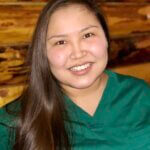There are not that many of us who know from our youngest years what we want to do with our lives, but Daphne Williams is one of the fortunate ones. “Being a health aide was always in the back of my mind. My grandma, Pauline Peter, was one of the first-generation health aides, back before the Health Aide Program even started. She volunteered for 12 years, from 1956-1968, before she started getting paid and retired in 1994. She helped raise me, so I grew up hearing her work stories. She used to say, ‘When you are a Health Aide, everyone you work with becomes your family. You love everybody.’”

Born in Fairbanks but raised mostly in Nulato, Daphne started her career in Hughes. “My dad was from Hughes and in 2015, I went to visit for moose hunting. I stayed for the potlatch and that was when my aunt handed me an application to become a health aide. I didn’t really think I would qualify but I was selected. I went through the training and pretty soon I was back in Hughes and ready to work.”
Daphne remained in Hughes for over three years before she became restless. She still loved her job, so decided that what she really needed was a change of scenery. In 2019, she moved to Fairbanks and transitioned into an itinerant health aide position. While she misses many aspects of living in a small village, especially one where she has many relatives from her father’s side of the family, Daphne loves the freedom of an itinerant’s life. She is able to select when she wants to work, as well as where her next placement will be and for how long. There is also an excitement and a challenge to arriving at a new placement and having to learn about new people and new office protocols.
When she is not working, Daphne enjoys travelling in and outside of Alaska, although COVID put a stop to that last year. She comes from two very large families, which means lots of relatives to visit, and the fishing and moose hunting in Nulato always summon her home. When she has free time, Daphne’s main way of relaxing is doing beadwork on moose skin and watching her favorite TV shows.
Daphne loves her job, being a lifeline for people when they are at their most vulnerable. “And I love how I have to keep learning new things, about treatments as well as about administrative tasks. But there are challenges. The hardest is the anxiety of it, always worrying about everyone. Being on call is hard, too, because it is hard to relax and have fun.”
Just as for every first responder, the pandemic has made the job of a health aide more difficult. For a time, there was no travel permitted. Then, when being able to get in and out of a village was once more allowed, there was still a quarantine period involved.
Then there were all the new and evolving guidelines about how to keep herself, her patients and all the village residents safe. As scientists discovered more about the how the virus was transmitted, all of the health aides had to keep updated and translate any new information for people who had no medical training and were confused, and sometimes angry, about why the advice seemed to keep changing. While the pandemic slowed down the lives of many people, reducing job responsibilities and contact with others, for health care workers like Daphne it meant a whirlwind of increased responsibilities. And while some things are returning to normal, it is clear that her job will never be the same.
Still, Daphne would not hesitate to recommend this career to others. “There are so many reasons this is a great job. You help people when they need it most. You have constant opportunities to learn, to stretch yourself. The pay and benefits package is great, and you can choose to live in one place or to travel as an itinerant. There is a lot of support from other health aides and supervisors. However, you do need to be prepared to establish boundaries. People think that whenever they see you, they are entitled to ask questions about their health, even if it means they are interrupting a family dinner. Sometimes it’s the ones closest to you who challenge your ability to remain professional, but stick to those boundaries.”
Daphne wants to be sure that her support system is acknowledged. “I want to thank those who stood by my side when the job got tough, and I needed support. I want to thank my aunts and uncles for all the breakfasts and lunches brought to me at work. I want to thank my grandparents for all their love and wisdom they shared. I want to thank my coworkers for their support, and the training center staff for all that they do. I especially want to thank my mother for being my voice when I felt like I did not have one, and for always doing anything she can to help ease some stress or make me feel good. I feel like I wouldn’t have made it this far in my career, if it weren’t for the amazing support system you learn to build in this community.”
Jo Miller, Daphne’s supervisor and thus a part of her support system, says, “It has been such a pleasure to work with Daphne over the last 5-1/2 years now. She has truly blossomed in her career as a community health aide practitioner. Without reservation, Daphne even took on an additional role on the vaccine team traveling almost daily to several TCC villages to administer much needed COVID immunizations. She is undoubtedly dedicated to improving the health of the communities she serves!”
